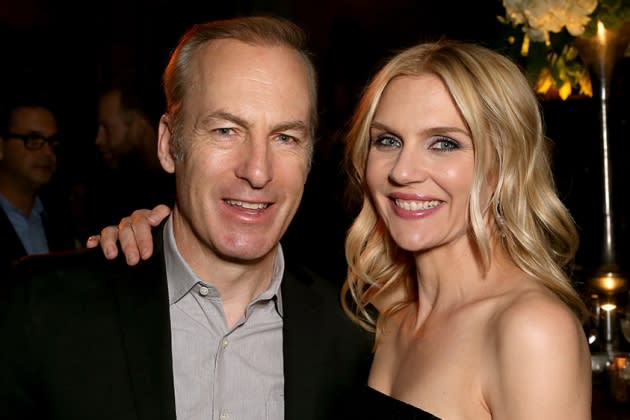Did ‘Better Call Saul’ Get a Happy Ending? Bob Odenkirk and Rhea Seehorn Weigh In
- Oops!Something went wrong.Please try again later.
- Oops!Something went wrong.Please try again later.
- Oops!Something went wrong.Please try again later.
- Oops!Something went wrong.Please try again later.

“Better Call Saul” ended Monday night with an ending very different than the way that “Breaking Bad” concluded. No shootout, just Jimmy McGill behind bars. But as Jimmy and ex-wife Kim Wexler reconnect, in many ways it’s also a much more hopeful conclusion. But can we go as far as to call it a “happy ending?”
“I think it is,” star Bob Odenkirk tells Variety’s Awards Circuit podcast, in a bonus edition recorded Tuesday morning — just hours after the finale aired. “It’s crazy, because he’s going to jail for the rest of his life. But I absolutely consider it the best end he could have had. Because he’s at peace with himself. And he’s got her. He’s earned her love. And he knows that even though they can’t be together. He proved himself to the one person who he cared about.”
More from Variety
Republicans in New Mexico Are Furious Over 'Breaking Bad' Statues: 'We're Glorifying Meth Makers'
'Better Call Saul' Stars Break Down That Final Cigarette Scene and Flash of Color
'Better Call Saul's' Brilliant, Emotional Finale Is 'Breaking Bad' in Reverse: TV Review
Rhea Seehorn, who joined Odenkirk for the podcast, agrees: “I mean, happy is hard to wrap your head around. But I find it hopeful and I do find it to be a positive. I do think it’s like, there is light there. And I agree with Bob, it’s about living without the burden that they both have had hanging over them their whole lives, trying to outrun what people think of them. Certainly Jimmy more than Kim, but we know Kim didn’t come from a safe, positive upbringing either. I found it to be a positive ending. And the happiest that you could be for those people.”
Odenkirk and Seehorn had joined much of the series’ cast and producers on Monday night to screen the finale in Odenkirk’s home. And the duo say it was an intense, emotional gathering.
“If you needed to hear a pin drop you were in the right room,” he says. “It was just one of the best nights of my life.” Adds Seehorn: “If we could have invited every single person we would have, but we were crammed into Bob and Naomi’s living room. So we did the best we could. It was lovely — tears, joy.”
Odenkirk and Seehorn break down the finale, including Odenkirk’s courtroom scene (which took three days to shoot), the return of “Breaking Bad” stars Betsy Brandt and Bryan Cranston, Saul’s decision to turn back into Jimmy for Kim’s benefit, and the final scene between Jimmy and Kim. Listen below!
“There were just a lot of feelings in that room,” Odenkirk says of screening the finale with his colleagues. “Six years of the show, for all of us the biggest show in our lives. You knew the risks that Vince and Peter took in giving us these great parts.”
Addressing Saul’s decision to give up an easy seven-year prison sentence to fully confess for his crimes, and whether Saul had completely suppressed Jimmy until that moment, Odenkirk says, “He’s always Jimmy McGill. He’s just on a program. He’s running a program when he saw good, and he’s doing it with conscious effort. He’s choosing to be this guy. And it’s working for him. He’s enjoying it. And he’s not feeling doubt. And he’s not wanting anyone’s love who’s not going to give it to him. And he’s not wanting anyone’s approval, who’s not going to give it to him. But Jimmy is still inside him.”
That’s why, in the finale, “it’s letting go of that facade, that allows him to be as honest as he is in that courtroom. And he needs to do that to be at peace with his life. It’s just a beautiful thing that they wrote. And I think for the right reason. If Kim wasn’t in that room, he would have run his little game and gotten his seven years.”
As for the final scene, where Kim and Jimmy share a cigarette in a reference to the show’s first episode, Odenkirk says, “It’s the two characters at peace with themselves and realizing what a great relationship they had. Not that they didn’t know that. But I think in that moment, there’s really a sense of like, this was the best, just a person you can hang out with, is always the best.”
Also in the podcast, Seehorn gives more of her thoughts on Kim’s past and upbringing, and what may be next for the character. (Including a spinoff?) And the two actors discuss regret, which is a theme of the final episode, as well as working with icon Carol Burnett and much more.
Variety’s “Awards Circuit” podcast, produced by Michael Schneider, is your one-stop listen for lively conversations about the best in film and television. Each week “Awards Circuit” features interviews with top film and TV talent and creatives; discussions and debates about awards races and industry headlines; and much, much more. Subscribe via Apple Podcasts, Stitcher, Spotify or anywhere you download podcasts. New episodes post weekly.
Best of Variety
Sign up for Variety’s Newsletter. For the latest news, follow us on Facebook, Twitter, and Instagram.
